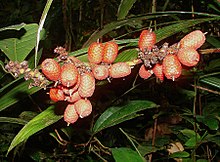Gualicho
| Gualicho Temporal range: Late Cretaceous, | |
|---|---|
 | |
| Skeletal reconstruction, with known elements in white | |
| Scientific classification | |
| Kingdom: | Animalia |
| Phylum: | Chordata |
| Clade: | Dinosauria |
| Clade: | Saurischia |
| Clade: | Theropoda |
| Clade: | Orionides |
| Clade: | Avetheropoda |
| Genus: | †Gualicho Apesteguía et al., 2016 |
| Type species | |
| †Gualicho shinyae Apesteguía et al., 2016 | |
| Synonyms | |
| |
Gualicho (named in reference to the gualichu) is a genus of theropod dinosaur. The type species is Gualicho shinyae. It lived in what is now northern Patagonia, on what was then a South American island continent split off from the supercontinent Gondwana. The fossils were found in the Huincul Formation, dating to the late Cenomanian-early Turonian age of the upper Cretaceous Period, around 93 million years ago.
Discovery
On 13 February 2007, Akiko Shinya, preparator of the Field Museum of Natural History, east of the Ezequiel Ramos Mexía Reservoir at the Rancho Violante, discovered the skeleton of a theropod new to science. In 2016, the specimen was named and described by Sebastián Apesteguía, Nathan D. Smith, Rubén Juárez Valieri and Peter J. Makovicky. The generic name is derived from the gualichu, a demon of local folklore. The specific name honours Shinya as the animal's discoverer.[1]
The holotype, MPCN PV 0001, consists of a partial skeleton lacking the skull. It contains four vertebrae of the back, three vertebrae of the middle tail, ribs, a basket of belly-ribs, the left shoulder girdle, the left forelimb, the right lower arm, the lower ends of both pubic bones, the right thighbone, the lower end of the left thighbone, the upper ends of the right shinbone and calf bone, elements of both metatarsi and three toes of the right foot. Most bones were uncovered in their original anatomical position but much of the skeleton had been destroyed by erosion.[1]
Gualicho는 후인쿨 층에서 알려져 있고 그들의 미추골의 [2][3]유사성으로 볼 때 비올란테 유적지에서 발견된 메가랍토란 아오니랍토르의 동의어로 제안되어 왔다.만약 사실로 밝혀진다면, Gualicho라는 이름은 전례가 있을 것이고, 이것은 또한 MPCA-Pv 804/1에서 804/25로 알려진 Gualicho에 두 번째 표본을 추가하게 될 것이다. 이 표본은 마지막 천추, 6개의 근위 꼬리뼈, 4개의 중앙 꼬리뼈, 그리고 5개의 혈액 아치로 구성될 것이다.
묘사

잘 알려진 티라노사우루스처럼 6-7m(20-23피트)의 귈리초는 팔이 줄어들고 손가락이 두 개일 수 있지만, 2020년 연구는 세 번째 [4]손가락에 충분한 세 번째 중수골이 존재함을 시사한다.이 발견은 [5]궈리쵸가 애초 카르노사우루스였다면 카르노사우루스가 티라노사우루스류나 아벨리사우루스류처럼 사지가 축소되는 진화를 겪었을 수 있음을 시사한다.
분류
계통학적으로 볼 때, 귤리초는 두 가지 가능성을 제시하는데, 메가랍토란과 네오베나토리드가 카르노사우루스류이거나 메가랍토란과 네오베나토리드가 [1]카르노사우루스류보다 실루로사우루스와 더 가까운 수각류 등급이었을 가능성이 있다.
아래 분해도(cradogram)는 세바스티안 아페스테기아의 2016년 분석을 따른다.스미스, 루벤 후아레스 발리에리, 피터 J. 마코비키.[1]
| 알로사우루아과 |
| ||||||||||||||||||||||||||||||||||||||||||
아래 분해도(cradogram)는 포르피리 외 연구진(2018)의 계통발생학적 [6]분석에 의해 발견된 가장 근소한 12개 나무(표본 분류군 사이에 진화 또는 손실된 표본 특징의 총 양 측면에서 가장 단순한 진화 경로)의 엄격한 합의(평균 결과)를 따른다.결과는 다르지만 방법론 분석은 Apesteguia [1]등(2016년)의 분석에서 표본화되지 않은 두 개의 메가랩토란인 Tratayenia와 Murusraptor를 포함했다는 사실만 다를 뿐 실질적으로 동일했다.
| 아베테로포다 |
| ||||||||||||||||||||||||||||||||||||||||||||||||||||||||||||||||||||||||||||||||||||||||||
「 」를 참조해 주세요.
레퍼런스
- ^ a b c d e Apesteguía S, Smith ND, Juárez Valieri R, Makovicky PJ (2016). "An Unusual New Theropod with a Didactyl Manus from the Upper Cretaceous of Patagonia, Argentina". PLOS ONE. 11 (7): e0157793. Bibcode:2016PLoSO..1157793A. doi:10.1371/journal.pone.0157793. PMC 4943716. PMID 27410683.
- ^ Mortimer M (2016-07-13). "Is Gualicho Aoniraptor?". The Theropod Database Blog. Retrieved 14 July 2016.
- ^ Cau A. "Nuovi resti di Aoniraptor? Ehm... Benvenuto Gualicho!". Theropoda. Retrieved 14 July 2016.
- ^ Ibrahim, Nizar; Sereno, Paul C.; Varricchio, David J.; Martill, David M.; Dutheil, Didier B.; Unwin, David M.; Baidder, Lahssen; Larsson, Hans C. E.; Zouhri, Samir; Kaoukaya, Abdelhadi (2020-04-21). "Geology and paleontology of the Upper Cretaceous Kem Kem Group of eastern Morocco". ZooKeys (928): 1–216. doi:10.3897/zookeys.928.47517. ISSN 1313-2970. PMC 7188693. PMID 32362741.
- ^ Davis N (13 July 2016). "Meet Gualico shinyae, the puny armed distant relative of T-rex". The Guardian. Retrieved 13 July 2016.
- ^ Porfiri JD, Juárez Valieri RD, Santos DD, Lamanna MC (March 2018). "A new megaraptoran theropod dinosaur from the Upper Cretaceous Bajo de la Carpa Formation of northwestern Patagonia". Cretaceous Research. 89: 302–319. doi:10.1016/j.cretres.2018.03.014. S2CID 134117648.




















